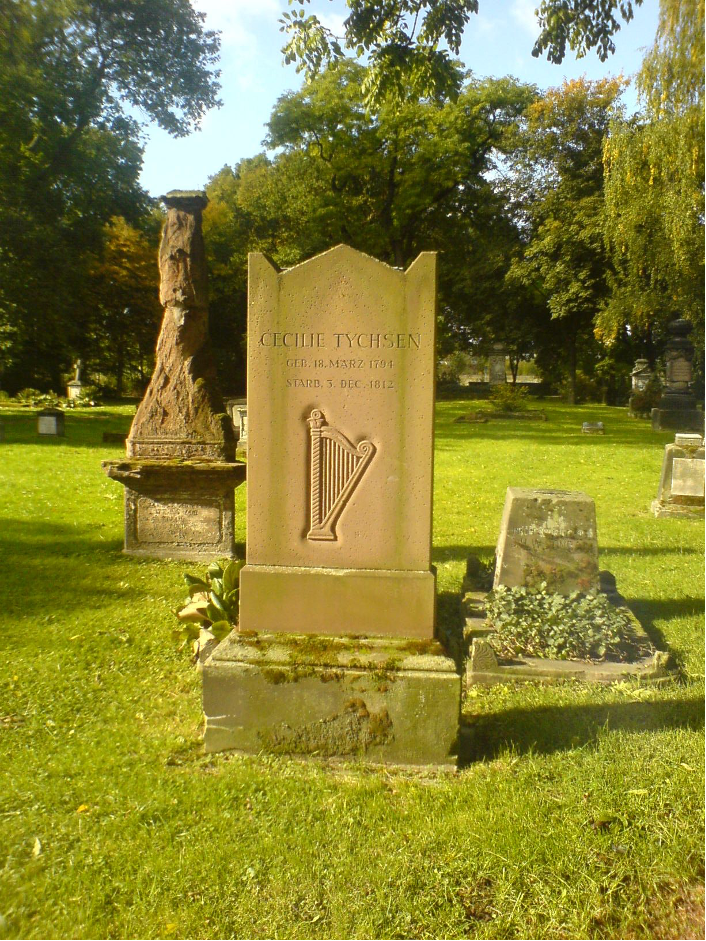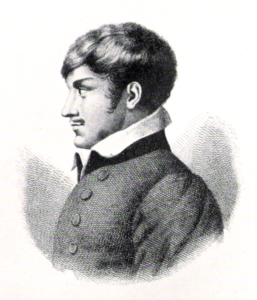In January 1817 (Deep sorrow)
(Poet's title: Im Jänner 1817 (Tiefes Leid))
Set by Schubert:
D 876
[December 1825]
Ich bin von aller Ruh geschieden
Ich treib umher auf wilder Flut;
An einem Ort nur find’ ich Frieden,
Das ist der Ort, wo alles ruht.
Und wenn die Wind’ auch schaurig sausen,
Und kalt der Regen niederfällt,
Doch will ich dort viel lieber hausen,
Als in der unbeständ’gen Welt.
Denn wie die Träume spurlos schweben,
Und einer schnell den andern treibt,
Spielt mit sich selbst das irre Leben,
Und jedes naht und keines bleibt.
Nie will die falsche Hoffnung weichen,
Nie mit der Hoffnung Furcht und Müh;
Die Ewigstummen, Ewigbleichen
Verheißen und versagen nie.
Nicht weck ich sie mit meinen Schritten
In ihrer dunklen Einsamkeit;
Sie wissen nicht, was ich gelitten,
Und keinen stört mein tiefes Leid.
Dort kann die Seele freier klagen
Bei Jener, die ich treu geliebt;
Nicht wird der kalte Stein mir sagen,
Ach, dass auch sie mein Schmerz betrübt.
I have been cut off from all rest,
I am being tossed about on a savage flood;
There is only one spot where I can find peace,
That is the spot where everything is at rest.
And even if the wind roars dreadfully
And cold rain is pouring down,
I would much rather settle there
Than in this inconstant world.
So, just as dreams float past leaving no trace behind
With each one driving away the other,
My crazy life plays with itself,
Each one approaches but none of them remain.
False hope will never fade,
Nor will fear and trouble along with hope.
Those who are silent for ever, those who are pale for ever,
They never make promises or rejections.
With my footsteps I shall not awaken them
In their dark solitude;
They do not know what I have suffered
And my deep sorrow is not disturbing anyone.
It is there that my soul can lament more freely,
With her, the one I loved faithfully;
The cold stone is not going to say to me,
Alas, that my pain has distressed her too!
All translations into English that appear on this website, unless otherwise stated, are by Malcolm Wren. You are free to use them on condition that you acknowledge Malcolm Wren as the translator and schubertsong.uk as the source. Unless otherwise stated, the comments and essays that appear after the texts and translations are by Malcolm Wren and are © Copyright.
☙
Themes and images in this text:
Detours and delusions Dreams Floods and tides Graves and burials Hope Laments, elegies and mourning Rain Rest Soul Wind
The last entry in Schulze’s Poetic Diary (Poetisches Tagebuch) is dated 17th February 1817, so this text (from exactly a month earlier) was one of his final poems. He was to die a few months later, on 29th June 1817. There is another crucial date that helps us to make sense of the text: on 3rd December 1812 (four years previously) Cäcilie Tychsen had died from tuberculosis. It is her grave that is the ‘one spot’ the poet identifies as the place where he can find rest, and it is her gravestone which speaks to him reassuringly at the end of the poem.
Cäcilie, being so safely dead, can no longer torment him by either making promises (which will be broken) or rejecting his advances (if he ever made them in real life not just in his fantasy world). Although her sister (Adelheid) was still alive and still free to make promises or rejections, Schulze claims that he would prefer to make his home in the graveyard with Cäcilie and the other corpses around her (‘those who are eternally silent and eternally pale’). There is a chance of him finding the rest here that is unavailable to him in the raging floods of his life elsewhere.
He recognises that life has buffetted him. He has been led astray, going in crazy directions (‘das irre Leben’). We know that he joined up as a soldier in the Wars of Liberation to pay homage to his departed beloved (who had been a firm opponent of the French occupation of the ‘German’ lands). We know that he habitually stomped and rode around the countryside near Göttingen. We know that he wrote obsessive lyrics about his unrequited love, none of which seemed to help him resolve his torment.
He shows just enough self awareness to recognise that his behaviour might be disturbing other people. That, he says, is another advantage of setting up home in Cäcilie’s graveyard. His footsteps are not going to wake the people in the rooms downstairs (or at least they are not in a position to complain if he is making too much noise). The cold stone on her grave offers no reproof; he is free to indulge in his self-pity as much as he likes (‘my soul can lament more freely’).

https://creativecommons.org/licenses/by-sa/3.0
☙
Original Spelling and note on the text Im Jänner 1817 (Tiefes Leid) Ich bin von aller Ruh geschieden Ich treib' umher auf wilder Fluth; An einem Ort nur find' ich Frieden, Das ist der Ort, wo alles ruht. Und wenn die Wind' auch schaurig sausen, Und kalt der Regen niederfällt, Doch will1 ich dort viel lieber hausen, Als in der unbeständ'gen Welt. Denn wie die Träume spurlos schweben, Und einer schnell den andern treibt, Spielt mit sich selbst das irre Leben, Und jedes naht und keines bleibt. Nie will die falsche Hoffnung weichen, Nie mit der Hoffnung Furcht und Müh. Die Ewigstummen, Ewigbleichen, Verheißen und versagen nie. Nicht weck' ich sie mit meinen Schritten In ihrer dunklen Einsamkeit; Sie wissen nicht, was ich gelitten, Und keinen stört mein tiefes Leid. Dort kann die Seele freyer klagen Bey Jener, die ich treu geliebt; Nicht wird der kalte Stein mir sagen, Ach, daß auch sie mein Schmerz betrübt! 1 Schubert changed Schulze's 'mag' (might) to 'will' (would)
Confirmed by Peter Rastl with Schubert’s source, Ernst Schulze’s sämmtliche poetische Schriften. Dritter Band. I. Poetisches Tagebuch. […] Leipzig: F. A. Brockhaus. 1819, page 196; and with Sämmtliche poetische Werke von Ernst Schulze. Neue Ausgabe mit sechszehn Kupfern. Dritter Theil. Leipzig: F. A. Brockhaus. 1822, page 200.
To see an early edition of the text, go to page 196 [212 von 336] here: http://digital.onb.ac.at/OnbViewer/viewer.faces?doc=ABO_%2BZ170542803


